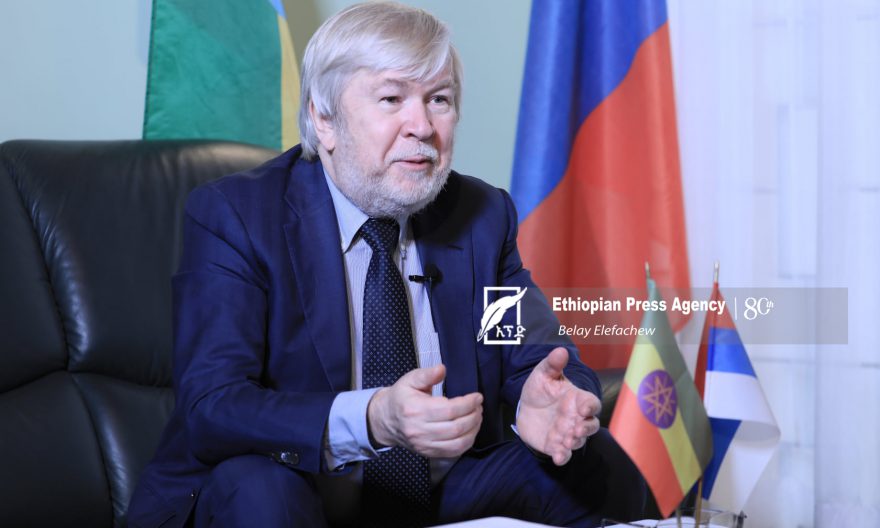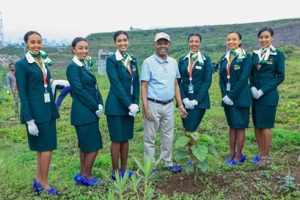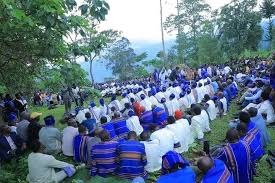
BY GIRMACHEW GASHAW
“The strong bilateral relations between Ethiopia and Russia date as far back as the 15th or 16th century” says Evgeny Terekhin, Ambassador of Russian Federation to Ethiopia. The relations that was initiated by the religious leaders of the two countries who met in Jerusalem by then, continued to grow up throughout the centuries. The two countries collaborated during the time of war or aggression. For instance, Ambassador Terekhin says, Russia’s 17th century King Alex had an interest to collaborate with the Ethiopian emperor of the time in the fight against their common enemy, which did not materialize due to distance.
Again when Italy invaded Ethiopia in 1896, Russia provided support. Currently the collaboration between Russia and Ethiopia has attained a high level like working together in the development of nuclear technology for peaceful purposes. This is only a few of the wide ranging scope of the ties between the two countries.
From his deeper knowledge about Ethiopian history, language and culture Ambassador Terekhin has elaborated on a range of issues about the strong and long standing Ethio-Russian relations. Excerpts:
Would you please tell us about the historic and long-standing relations between Russia and Ethiopia in connection with the Adwa victory which resolved racial perspective?
When we see the long-standing relations between Russia and Ethiopia, it is indeed ancient. It goes as far back as the 15th and 16th centuries. During that time, religious leaders of the two countries met in Jerusalem and started relations. As the dogma of the two countries was similar, the relationship continued to get stronger and stronger. However, it was very difficult to establish government to government relations as the two countries were far from each other geographically. At that moment the two countries were fighting common enemies of their own. Due to this, the two sides developed interest to raise their cooperation.
Here I want to mention historic paradigms to better elaborate the bilateral ties. In the 17th century, there was a Russian king named Alex. He heard that Ethiopia was at war with Turkey and the king had a desire of defeating them with the help of Ethiopia. Though the plan seems to be fantastic, it was quite pragmatic. This witnessed the interest of the two countries to collaborate in practical terms. The relations between them were spiraling as the culture exchange intensified step by step. In the middle of 19th century, one of the Russian Universities began to offer lessons of Amharic language and literature courses for the first time.
As Russians had a desire to know more about the culture and history of Ethiopia, they have visited Ethiopia and widely spoke about Ethiopia to their friends. Ethiopian kings also heard about Russia and their delegates visited our country. Russia became a strategic ally for the rest of Africa. When Menelik II came to power, the relations between the two countries have also increased with his search of a partner in Europe.
In 1886, when Italy invaded Ethiopia, the sympathies of the people of Russia were on the side of [Ethiopian] forces to reverse the war. Here it is important to mention the name of one military officer called Leontiev. For his contribution, Emperor Menelik II accorded him Ethiopia’s higher military rank- Dejazmach. The name of Leontiev remained forgotten for many years. There is a saying that goes by a country that does not remember its champions will not have future history. And we are now trying to remember him.
Apart from providing material support, Russia had been providing technical assistance. By then Russia sent armaments of various kinds to Ethiopia through the Red Sea, which was intercepted and held
by Italy until the war ended. In 1898, the first Russian diplomatic mission came to Ethiopia and established diplomatic relations. So, the relation between the two countries both in content and structure basing on mutual benefit, cooperation, trust, esteem was laid down.
As you told me earlier, Russia had started to provide the Amharic language in its universities. How many universities are now educating the Amharic language?
Kharkiv was the first university to teach Amharic as a foreign language. In 1902, the then ambassador was a graduate of this university. Nowadays Amharic is studied in at least four Russian Universities in Moscow in St. Petersburg.
What are the enabling conditions that allow the two countries to further strengthen the bilateral ties between the two countries?
One is that the two countries had closer relations in terms of religion. As they have mutual benefit, they have approached by one another more than ever before even though there were various challenges to do so. Geographical distance, hurdles due to European colonial powers etc. Despite of all these problems the relations between the two countries intensified.
How do you see the law enforcement operation in Tigray state?
The Russian Government has been repeatedly explaining its stance. What happened in Ethiopia is its internal affair and it should get a local response. Other countries should not interfere in it. Some countries are forwarding ideas or advices out of good faith, but they do not know if that will be convenient to the country or not. I want to tell you something here. “No one is more catholic than the Pope”. No foreigner can know the problem of Ethiopia better than Ethiopians. Washington or Brussels or anybody else from the outside world could not bring a solution for this.
Would you please tell us about economic cooperation between the two countries?
The economic cooperation between the two countries has been facing various ups and downs. There were intensified economic relations in the era of socialism especially after the 1974 revolution. Hence, we have to remember one thing; cooperation was established based on political thought. After that basic
conditions have changed. Socialism as a political thought has passed and we have to renew/establish new approaches in this regard. This can be done through cooperation and mutual benefit. To be frank, after 1991, my country had undergone various problems. It has no chance to think about foreign economic options for almost 20 years.
As the situations are improving and the country’s economy strengthening, we have got a chance to perceive opportunities in our cooperation with other countries. We are trying to work with our partners including Ethiopia to ensure mutual benefit. Even though the projects are wide enough, they will be intensified. The most important thing is laying the foundation. Melka Wakena hydropower plant, for instance, is a project built by the Soviet Union just 33 years ago. It needs renovation.
Previously, one of the four turbines went out of service due to a flood. We have the desire to maintain the plant. We have been making a feasibility study together with Ethiopian partners to mobilize funds and hopefully we will discharge the project. There are additional plans and projects. Private investors may also be involved in new projects. For instance, to replace old Lada taxis, we are exploring a possibility to bring here new products. There are also other projects.
How do you evaluate the involvement of private investors in the economy over the past years?
It is not easy. Surprisingly, investors of the two countries have not been well familiar with one another. Though there are attempts to communicate with investors of the two countries, the result would not be achieved easily. But I have a strong belief in the future chance of progress.
What about cultural relations?
Culture is a very wide sector. It includes many things, for example, education. During the Derg regime, Russia had accepted more than 600 students per year. Presently, though, the number is not that much big, the country still provides a scholarship for 30 students per year and has now climbed up to 50. Hopefully, the number will rise even more in the coming years. About cultural exchange, the task will not be taken as an easy one. The two countries have a strong desire to correlate with one another. So, this has been supported by funds and we are now searching for investors who sponsor us. About humanitarian activities, for instance, medical service, we have Balcha Hospital; we have to improve many things such as renew the building, import state of the art equipment. Now we are working on it.
Ethiopia has a desire to develop nuclear power in collaboration with the Russian government. How do you see the progress of the collaboration in the technology?
Nuclear power is an issue of advanced technology. Cooperation between the two sides especially in nuclear technology is heard here and there. It is not incidental. It is possible to say that the country, which becomes a member of so called “Nuclear club”, has reached a higher level. We are ready to help Ethiopia benefit from the nuclear technology.
The two countries have signed a basic agreement on nuclear technology when Prime Minister Dr. Abiy Ahmed participated in the 2019 Russia Africa Summit in Sochi. The agreement became instrumental after the House of People’s Representatives endorsed it in December last year. Two additional memoranda of understanding in this field have just been signed. The benefit of nuclear technology is not limited to power generation alone. It is possible to provide nuclear-based medical services, to save 25 per cent agricultural outputs from being dumped as wastage.
To do this, it is essential to put into service a research reactor. By and large, nuclear energy has diversified benefits. However, nuclear technology should not be taken as the only advanced technology and there are many other fields of modern science which improve the lives of many people. Recently, an agreement on Scientific and Technical Cooperation between Keldysh Institute of Applied Mathematics of the Russian Academy of Sciences (KIAM RAS) and Ethiopian Space Science and Technology Institute (ESSTI) was signed in Addis Ababa.
Negotiations are also continuing between the Institute of Astronomy of the Russian Academy of Sciences and the Ethiopian Entoto Observatory on the issue of creating a Center of reception of scientific information of the Russian space project WSO-UV by putting additional telescopes there. What is more, there is a Biological Expedition that was established jointly between the two countries and served for the past 33 years. They have been undertaking various biological researches important to the agriculture and ecology of the country. To strengthen it, there have been desires to establish a joint Biological Institute.
Would you tell us about the bilateral effort of the Russian government and east African countries to ensure stability in the Horn?
When we say regional security, it has various dimensions. Security can be strengthened or supported using various mechanisms. First of all the security can be ensured through political effort. The cooperation between our two countries continued for many decades. Recently, when Ethiopia was a member of the UN Security Council, we gave special consideration to the matter. On the other hand, it is the government defence forces that ensure the peace and security of the Horn. This is the reality. Russia has been providing military support to Ethiopia to strengthen its defence ability since 1896. If a given country wants to protect its peace, it has to be strengthening its economy. So, we also provide unreserved support in this regard. Hence, it is possible to say that to ensure regional security, we will provide multilateral overall support.
In terms of the integration among Horn countries such as Ethiopia, Somalia and Eritrea, it is a matter left for them. If their integration benefits the Horn’s security, we would support them. The security of the Horn is highly dependent on the recurrent situation in Ethiopia and that is why we bestow special place for it. If there is peace and security in Ethiopia, it will have a great and vital impact on the stability of the region.
Recently, Russia-Africa inter-party dialogue was held at which Prime Minister Abiy Ahmed said Africa and Russia should intensify the longstanding relations. What would be the area of cooperation in this regard?
As you know Russia has wide ranges of relations with African countries in various fields. One is inter-party relations. Until 1991, the then ruling Communist Party of the USSR had close relation with African parties including the Workers Party of Ethiopia (WPE). However, right after 1991, the inter-party relations have diminished. There were many reasons for this. One is that new young political parties were created in Russia. During the last 30 years, only a few of them survived as a party by strengthening themselves, while the rest vanished. Following the potency of the country, parties are becoming stronger than ever before. These parties are strengthening relations with parties of other countries. We consider inter-party dialogue as a vital part of our overall relations. The inter-party dialogue, especially between the ruling parties, such as “United Russia” in our country and “Prosperity Party” in Ethiopia, facilitates conditions to strengthen government -to-government, state-to-state and finally people-to-people relations.
Taking this opportunity, I would like to give due respect for the address to the above-mentioned inter-party conference by Prime Minister Abiy Ahmed who is also the chairperson of the ruling party of Ethiopia.
Thank you very much for your time!
Thank you!
The Ethiopian Herald 20 April 2021





